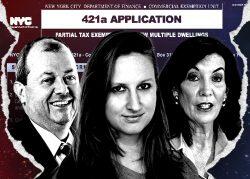Anh-Thu Nguyen and her two roommates don’t want to leave their apartment. Why would they? Although it won’t appear in Architectural Digest, it’s perfectly livable, it’s on the most prestigious street in Brooklyn’s nicest neighborhood, and it’s cheap.
Not only are they right across the street from 526-acre Prospect Park, the Olmsted and Vaux–designed jewel of the borough, but they have been paying low rent in a building that, if renovated, could command a lot more.
“This has been my home for 13 plus years. It’s a wonderful community and I want to stay here,” Nguyen said in an AFP story published by Yahoo Finance. Mother Jones reported the three-bedroom’s rent is $3,350, “only $150 more than the rent when Nguyen arrived in 2009, and a steal in a neighborhood where luxury three-bedrooms can rent for more than $6,000.”
The landlord was able to keep rents low by not investing in the building, yet it gained value anyway as demand for housing in Park Slope outstripped supply. Virtually nothing has been built in the neighborhood for decades except along its border with Gowanus.
Eventually, the owner converted the untapped potential into cash by selling to an investor willing to do the work necessary to realize it.
The buyer, Greenbrook Partners, specializes in such upgrades. But Nguyen and many fellow tenants don’t want their units and common areas fixed up — not if it means they have to move temporarily and pay higher rent when they return.
Their years of low rent were possible only because their landlord would ultimately sell the profit opportunity he had passed up. But the tenants are advocating for legislation and suing to take that opportunity away. If they succeed, Greenbrook will lose its right to let their leases lapse, clear the building and renovate it.
No tenants want to hear about the economics of rent. It is cold and harsh to talk about people’s homes in that way. But economics is about tradeoffs, and rent is a perfect example.
Renting has advantages over ownership. Chief among them: flexibility.
Tenants move for all sorts of reasons: a new job, new partner, new baby, change in financial circumstances, aging parents or just a fresh start somewhere else. Some buy a place. Activists attribute these moves to “displacement” and “gentrification,” even if they are voluntary.
If the neighborhood goes downhill, tenants can move out when their lease expires; landlords cannot move their buildings.
Read more



In fact, tenants can often get away with skipping their last few months of rent. A friend of mine just bought a condo in Texas and abandoned his rental complex with five months left on his lease. Fearing the purchase might fall through, he didn’t notify his landlord in advance. “People disappear from this place all the time,” he said with a shrug.
New York law forbids landlords from requiring security deposits of greater than one month’s rent, and from demanding the last month’s rent at the lease signing. As a result, some tenants stop paying months before they leave, betting that the landlord won’t spend on legal fees to chase after them.
Landlords make up for those losses by charging higher rent across the board and by rejecting potential tenants they fear will stop paying. You can guess which applicants tend to get rejected.
The point of the security-deposit law was to reduce move-in costs for tenants, who typically have meager savings. That’s good: When people are effectively trapped in their homes because they can’t afford first month’s and last month’s rent, plus a deposit, application fee and broker fee, it’s bad for society. Mobility makes the housing market and economy more efficient.
But the law has a cost, too: Tenants have an incentive to skip rent for months. (Evictions in New York can take a year or more.) Tradeoffs, remember?
Nguyen, who has a law degree, made a tradeoff when she became a labor organizer rather than, say, a corporate litigator. No doubt she finds her job more rewarding and interesting, and the hours more reasonable. But the pay is a lot less, so she might have to live somewhere besides Prospect Park West.
Had she known 13 years ago how much she would love Park Slope, perhaps she would have bought rather than rented. One tradeoff of buying is if you sell within five or seven years, factoring in closing costs, there’s a good chance you wasted money by not renting. On the plus side, if you stay put, your housing security and monthly costs are fairly predictable for 30 years.
What Nguyen and others want is the best of both worlds: The flexibility of renting and the predictability of ownership.
Their dream is wrapped up in a bill cleverly named “good cause eviction.” It guarantees lease renewals for tenants who are current on rent and are not a nuisance. The version pending in the New York state legislature would make it hard for landlords to raise the rent more than 3 percent or the rate of inflation, whichever is higher.
I have written about some of its tradeoffs, but omitted a few. One is that it would be harder to get rid of nuisance tenants. Pursuing a nuisance eviction is expensive and time-consuming, and some judges give the tenant the benefit of the doubt. Right now, landlords can simply non-renew a problem tenant. Under good cause, they would have to build a case. Many would not bother.
So if Nguyen’s upstairs neighbor began banging broomsticks on the floor at night, she would just have to live with it. This happened to a friend of mine in Park Slope. Drove him nuts. Nuisance tenants are not uncommon.
Another tradeoff of good cause is that Nguyen probably would not have been able to rent her underpriced apartment in the first place, for two reasons: First, landlords would glam up their units to capture the highest possible rent before leasing to a tenant who could remain indefinitely with limited rent hikes.
Second, landlords would rent to people unlikely to stay long, like college students or British bankers, rather than dyed-in-the-wool New Yorkers like Nguyen. Why? Under good cause, high rent increases would only be allowed when tenants leave. Potential long-term tenants would be turned away more often.
Like tenants, landlords respond to incentives. At this moment, they are keeping untold thousands of rent-stabilized apartments vacant, waiting for the tenants next door to leave so they can combine the units and set a new first rent. Otherwise, they are limited to the low “legal rent,” which can be less than it costs to operate the apartment.
Yes, landlords forsake rent while they keep units vacant, waiting for an international student or a chance to combine units. But they might make more money in the long run. It’s a tradeoff. Always a tradeoff.
